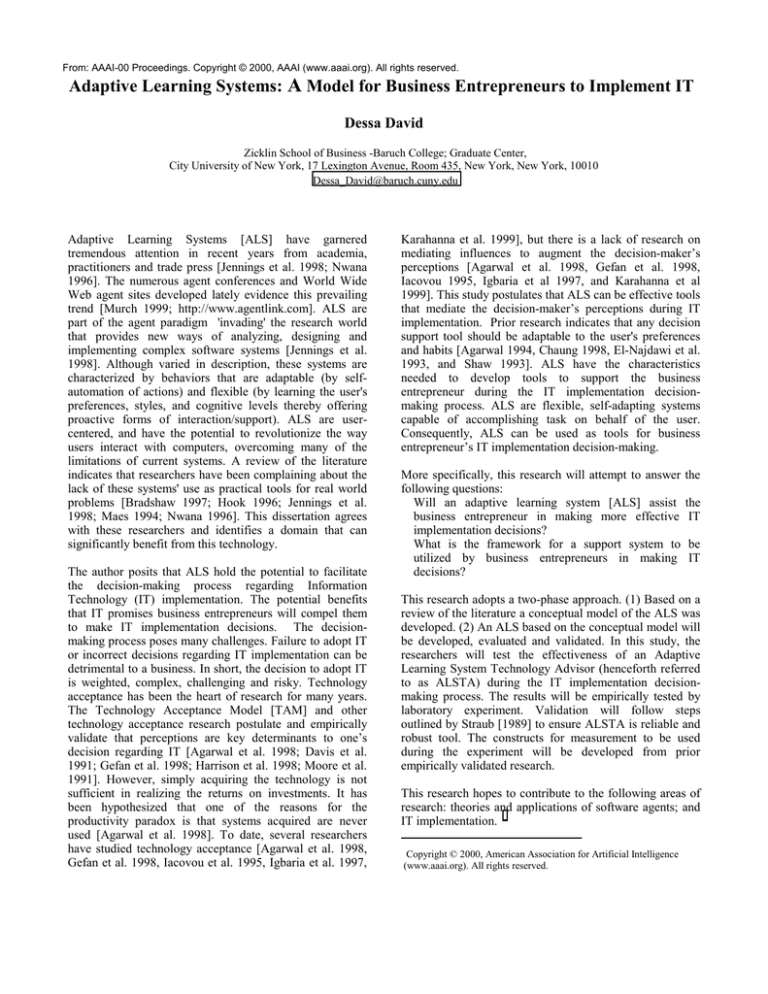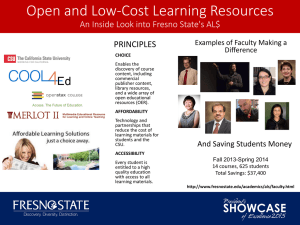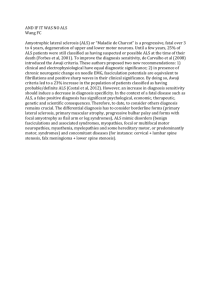
From: AAAI-00 Proceedings. Copyright © 2000, AAAI (www.aaai.org). All rights reserved.
Adaptive Learning Systems: A Model for Business Entrepreneurs to Implement IT
Dessa David
Zicklin School of Business -Baruch College; Graduate Center,
City University of New York, 17 Lexington Avenue, Room 435, New York, New York, 10010
Dessa_David@baruch.cuny.edu
Adaptive Learning Systems [ALS] have garnered
tremendous attention in recent years from academia,
practitioners and trade press [Jennings et al. 1998; Nwana
1996]. The numerous agent conferences and World Wide
Web agent sites developed lately evidence this prevailing
trend [Murch 1999; http://www.agentlink.com]. ALS are
part of the agent paradigm 'invading' the research world
that provides new ways of analyzing, designing and
implementing complex software systems [Jennings et al.
1998]. Although varied in description, these systems are
characterized by behaviors that are adaptable (by selfautomation of actions) and flexible (by learning the user's
preferences, styles, and cognitive levels thereby offering
proactive forms of interaction/support). ALS are usercentered, and have the potential to revolutionize the way
users interact with computers, overcoming many of the
limitations of current systems. A review of the literature
indicates that researchers have been complaining about the
lack of these systems' use as practical tools for real world
problems [Bradshaw 1997; Hook 1996; Jennings et al.
1998; Maes 1994; Nwana 1996]. This dissertation agrees
with these researchers and identifies a domain that can
significantly benefit from this technology.
The author posits that ALS hold the potential to facilitate
the decision-making process regarding Information
Technology (IT) implementation. The potential benefits
that IT promises business entrepreneurs will compel them
to make IT implementation decisions. The decisionmaking process poses many challenges. Failure to adopt IT
or incorrect decisions regarding IT implementation can be
detrimental to a business. In short, the decision to adopt IT
is weighted, complex, challenging and risky. Technology
acceptance has been the heart of research for many years.
The Technology Acceptance Model [TAM] and other
technology acceptance research postulate and empirically
validate that perceptions are key determinants to one’s
decision regarding IT [Agarwal et al. 1998; Davis et al.
1991; Gefan et al. 1998; Harrison et al. 1998; Moore et al.
1991]. However, simply acquiring the technology is not
sufficient in realizing the returns on investments. It has
been hypothesized that one of the reasons for the
productivity paradox is that systems acquired are never
used [Agarwal et al. 1998]. To date, several researchers
have studied technology acceptance [Agarwal et al. 1998,
Gefan et al. 1998, Iacovou et al. 1995, Igbaria et al. 1997,
Karahanna et al. 1999], but there is a lack of research on
mediating influences to augment the decision-maker’s
perceptions [Agarwal et al. 1998, Gefan et al. 1998,
Iacovou 1995, Igbaria et al 1997, and Karahanna et al
1999]. This study postulates that ALS can be effective tools
that mediate the decision-maker’s perceptions during IT
implementation. Prior research indicates that any decision
support tool should be adaptable to the user's preferences
and habits [Agarwal 1994, Chaung 1998, El-Najdawi et al.
1993, and Shaw 1993]. ALS have the characteristics
needed to develop tools to support the business
entrepreneur during the IT implementation decisionmaking process. ALS are flexible, self-adapting systems
capable of accomplishing task on behalf of the user.
Consequently, ALS can be used as tools for business
entrepreneur’s IT implementation decision-making.
More specifically, this research will attempt to answer
following questions:
Will an adaptive learning system [ALS] assist
business entrepreneur in making more effective
implementation decisions?
What is the framework for a support system to
utilized by business entrepreneurs in making
decisions?
the
the
IT
be
IT
This research adopts a two-phase approach. (1) Based on a
review of the literature a conceptual model of the ALS was
developed. (2) An ALS based on the conceptual model will
be developed, evaluated and validated. In this study, the
researchers will test the effectiveness of an Adaptive
Learning System Technology Advisor (henceforth referred
to as ALSTA) during the IT implementation decisionmaking process. The results will be empirically tested by
laboratory experiment. Validation will follow steps
outlined by Straub [1989] to ensure ALSTA is reliable and
robust tool. The constructs for measurement to be used
during the experiment will be developed from prior
empirically validated research.
This research hopes to contribute to the following areas of
research: theories and applications of software agents; and
IT implementation.
Copyright © 2000, American Association for Artificial Intelligence
(www.aaai.org). All rights reserved.







